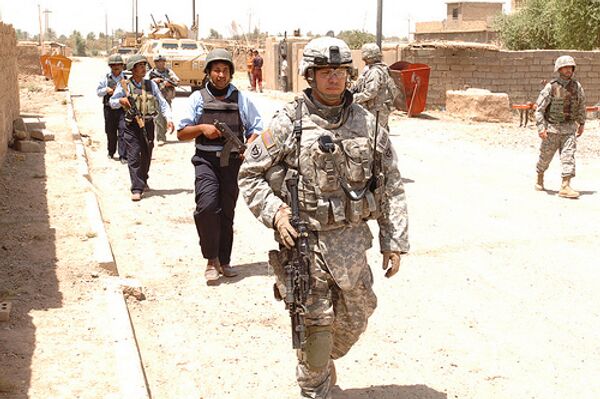Iraqi leaders have reportedly asked Washington to extend the U.S. military presence in their country beyond the withdrawal deadline in December.
A development of that magnitude would have made front-page news in America just a couple of years ago, but today it appears not to have caused a stir.
The Washington Post mentions it only briefly and in passing - an event not newsworthy enough to appear among the day's top stories, including the crackdown in Syria, the European debt crisis, and the political standoff over raising the U.S. debt ceiling.
Yet, this new development in Iraq may have far-reaching consequences in the region and beyond. And its impact is hard to predict.
The story has been unfolding for several months now.
Under a bilateral agreement concluded in November 2008, the roughly 46,000 U.S. troops currently in Iraq are scheduled to leave before the end of 2011. Iraqi leaders have been sending mixed signals to Washington for some time, suggesting they are open to U.S. troops remaining beyond the December 31 deadline but that internal disagreements prevented them from making a formal request. Officials in Washington, too, hinted that they were willing to leave some troops in Iraq. The withdrawal, meanwhile, went according to schedule.
Admiral Mike Mullen, the outgoing chairman of the U.S. Joint Chiefs of Staff, made a surprise visit to Baghdad earlier this week - his last as the United States' top military officer.
Mullen made it clear that the withdrawal of troops and military hardware was a big logistical challenge, so if the Iraqi leaders really wanted the deadline extended, they had to say so immediately. During subsequent talks with the admiral, President Jalal Talabani and Prime Minister Nouri al-Maliki officially requested that U.S. maintain its military presence.
Iraqi and American officials are now considering the possibility of a U.S. contingent staying behind to help train the Iraqi army. A lot of technical details must be hashed out first, and the negotiating process may take months.
Skeptics argue that Washington will never withdraw its troops and military bases from oil-rich Iraq as they are crucial to controlling the country's politics and natural resources. There are examples in recent history that suggest otherwise, though.
During the Vietnam War, the Americans had huge military bases in Thailand, in the Philippines, and in South Vietnam. But all the bases are gone now. These days, Washington continues its military cooperation with states in South East Asia; U.S. warships call at local ports and American officers help with the training of local service personnel. But the White House does not seek to control Asian oil or Asian politics.
Interestingly, some Asian countries are increasingly open to the idea of having a wider U.S. presence on their soil as a counterweight to the growing influence of China.
Admittedly, the withdrawal from Asia did not happen overnight; it began in the mid-1970s, following the U.S. withdrawal from Vietnam, and was not completed until after the end of the Cold War era in 1991.
What we are now seeing in Iraq is the early phase of a long and complicated exit. The situation on the ground is expected to change dramatically this December. Of the tens of thousands of U.S. troops initially deployed in Iraq, only 10,000 will be left by the end of this year. Even if reinforced with numerous Special Forces units and private security contractors, such a small contingent will not be able to act as an effective combat force. To ensure its safety, Washington will have to rely on soft power and smart maneuvering.
The months-long dispute between Iraq's political factions over requesting the assistance of U.S. military instructors attests to the country's disintegration. Religious and communal differences make the split even deeper.
Most of Iraq's political elite support the postponement of U.S. troop withdrawal, while the populace is vehemently opposed. Remember, when the pullout began in 2009, members of the Iraqi public took to the streets to dance in celebration).
It remains to be seen how determined the Iraqi government really is to maintain the U.S. military presence. Nor is it clear yet whether the current government will still be in power in a year or two.
Continued U.S. military presence in Iraq raises a whole array of questions that have no definitive answer.
Admiral Mullen has persuaded the Iraqi leadership to ask for an extension, but does this mean that his fellow Americans are happy about the prospect? Not necessarily. The issue is controversial both in the United States and in Iraq.
Will the downscaled U.S. force be able to hold back Iran's designs on Iraq?
Middle Eastern nations like Libya and Syria are splitting into warring enclaves. Will this have any long-term implications?
The U.S. also plans to drawn down its troop presence in Afghanistan and Pakistan, but all signs point to a residual force staying behind here too. It's hard to say how this partial withdrawal will affect these two countries and the surrounding region.
The views expressed in this article are the author's and do not necessarily represent those of RIA Novosti.



